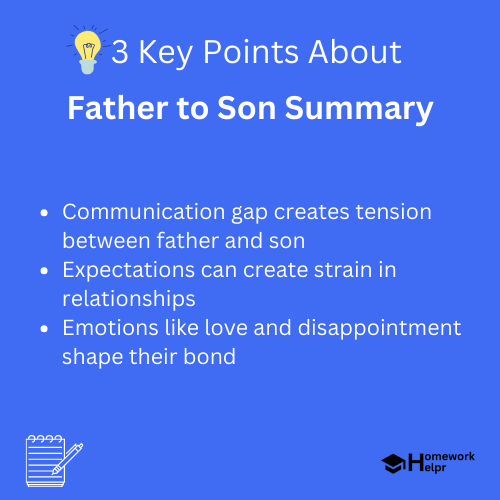📝 Summary
“Father to Son” is a poignant poem by Frank W. E. Williams that explores the intricate relationship between a father and his son. It delves into the themes of communication, expectations, and the emotional landscape that defines their bond. As the father witnesses his son striving for independence, he struggles with feelings of both pride and sorrow. This poem highlights the challenges of bridging emotional gaps and the importance of legacy in shaping identity and values, ultimately serving as a reflection on familial love and connection.
Father to Son – Summary
“Father to Son” is a poignant poem written by Frank W. E. Williams that beautifully captures the emotions and complexities in the relationship between a father and his son. This poem reflects the challenges, hopes, and unspoken expectations that often define this bond. As the father observes his son growing up and striving towards independence, he grapples with his feelings of both pride and sorrow. This article will delve into the themes, characters, and messages present in the poem to help students understand its significance.
1. Theme of Communication
One significant theme in “Father to Son” is communication, or rather the lack of it, between the father and son. As the son matures, the father realizes a growing distance, suggesting that the traditional modes of expression could have lost their power. This theme resonates with many families where interpersonal communication becomes strained as children enter adulthood.

For effective communication, the father recalls memories of their shared past, yet he feels it is difficult to bridge the gap that has developed. The emotional blocks lead to misunderstandings, and the father laments the inability to convey his feelings effectively. In essence, this theme highlights the importance of open dialogue in nurturing family relationships.
Definition
Interpersonal Communication: The exchange of thoughts, ideas, and feelings between two or more people.
2. The Nature of Expectations
Expectations play a crucial role in “Father to Son.” The father holds certain expectations for his son, wishing for him to inherit values and traits that he cherishes. However, as the son grows, he naturally starts to carve his own path, which often diverges from his father‚’ aspirations. This divergence creates tension, as each party struggles to understand the other‚’ perspective.
- The father believes he is shaping his son‚’ future through guidance.
- The son feels suffocated by the weight of his father‚’ desires.
- Both characters experience an internal struggle regarding their evolving identities.
Examples
For instance, a father may desire his son to pursue a career in medicine, while the son is passionate about the arts.
Definition
Expectations: Beliefs or assumptions about what will happen in the future, often based on societal norms or personal desires.
3. The Emotional Landscape
Another prevalent aspect is the emotional landscape that is woven throughout the poem. The father is depicted as a figure of wisdom, yet he is also vulnerable. The emotions displayed range from disappointment to love, creating a rich tapestry of feelings that resonate deeply with readers. The poem encourages individuals to acknowledge and embrace their emotions, fostering a more profound understanding of complicated familial connections.
The father‚’ sorrow stems from the realization that his son may not live up to the ideals he once imagined. Yet beneath the sadness, there is a strong undercurrent of love that binds their relationship, showcasing the dual nature of familial bonds.
Examples
A father may feel disappointed if his son chooses a different career than the one he envisioned; however, this disappointment is often outweighed by the underlying love and support.
4. The Role of Legacy
The concept of legacy is intrinsically tied to the father-son relationship. The father is keenly aware that his actions and decisions will shape the life and values of his son. The poem explores how legacy is not only about material inheritance but also about the transmission of ideals and beliefs. This theme reinforces the idea that parental guidance is crucial in molding a child‚’ character and worldview.
- A father might instill values of honesty and integrity in his son.
- Family traditions can serve as a legacy that influences future generations.
- The way challenges are faced in life can become a lesson for the younger generation.
Definition
Legacy: Something handed down from an ancestor or history, often relating to values, culture, or possessions.
5. Fun Fact about the Poem
❓Did You Know?
Did you know that the poem “Father to Son” has been studied in numerous literature courses for its profound insights into familial relationships? Its enduring relevance makes it a classic in understanding the dynamics of parenting.
6. Conclusion
In conclusion, “Father to Son” provides valuable lessons on communication, expectations, emotions, and legacy. Through the exploration of these themes, readers can gain insight into the complexities of parent-child relationships. The poem serves as a reminder that while relationships may evolve and change, the fundamental bond of love persists. As students reflect on their relationships, they will find that open communication, understanding of expectations, and acknowledgment of emotions can foster a more enriching connection with their parents. Ultimately, “Father to Son” is not just a poem; it is a lens through which we can examine our relationships and strive for growth and understanding.
Related Questions on Father to Son Summary
What is the main theme of the poem?
Answer: Communication between father and son is strained.
Why does the father feel disappointed?
Answer: His son may not meet his expectations.
What inspires the father’s expectations?
Answer: He hopes his son inherits cherished values.
What does the poem teach about love?
Answer: Love persists despite the evolving relationship dynamics.
